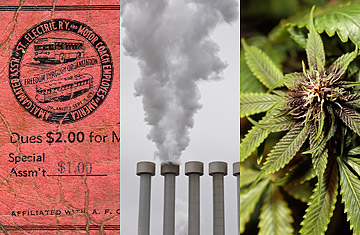
On Election Day 2010, California voters will face ballot initiatives on greenhouse-gas levels and the legalization of recreational marijuana use
Sifting through the avalanche of misinformation and p.r. spin in high-profile congressional contests may turn out to be the easy part. On Nov. 2, voters in 37 states will confront 160 ballot initiatives, from complex budget issues in Arizona and Virginia to perpetual wedge issues like taxes and health care reform. Beyond the less than momentous — like Missouri's pitch for dog-breeding regulations — are an array of ballot initiatives that tackle some of our thorniest social and economic questions.
The hottest battleground may be California, where residents are pondering Proposition 23, a measure that would shelve implementation of the state's 2006 law restricting greenhouse-gas levels until the state's unemployment rate falls below 5.5% for four consecutive quarters. It's a fitting flash point. Not only is California's current policy, which sets greenhouse-gas emissions at its 1990 level, the nation's most progressive, but in a symbol of industry's climate-change skepticism, Prop 23's key financial backers are two Texas-based oil companies, Valero Energy and Tesoro Corp., which have contributed a combined $6 million. And there is a $1 million backer in a refinery owned by Koch Industries, whose leaders, Charles and David Koch, have supported conservative causes ranging from the Tea Party movement to what Greenpeace has called "climate science denial." Despite the influx of out-of-state cash, Prop 23 seems unlikely to sway voters; in a recent Los Angeles Times/USC poll, 48% of Californians said they oppose the measure, compared with 32% who claim to support it.
The Golden State's other hot-button initiative concerns a different kind of smoke, as voters weigh whether to legalize recreational marijuana use. Voters seem split on Proposition 19, which would allow adults to carry up to 1 oz. of pot and cultivate the crop for personal use. In a recent Public Policy Institute of California survey, 42% of respondents backed the initiative, a hair above the 41% who opposed it. Supporters of the initiative — which was drafted by Richard Lee, who runs a Bay Area company that instructs students on how to grow and sell marijuana — say it could help close the state's budget gap, create jobs, curb violence and ease the strain on the state's sagging prison system. Detractors warn that easy access to pot could jumble local legal statutes, lead to an epidemic of stoned, accident-prone drivers and prompt users to turn to more dangerous drugs, like methamphetamine and cocaine.
Across the country, in South Carolina, Republicans like state representative Eric Bedingfield and attorney general Henry McMaster are pushing voters to pass a constitutional amendment that would guarantee a secret-ballot vote for union formation. The measure, which passed in both state legislative chambers, is a response to the Employee Free Choice Act (known as the "card check" bill), which has stalled on Capitol Hill but would require employers to recognize a union once half the company's employees sign onto it. The state Democratic Party opposes the initiative, and if it passes, the measure is almost certain to lead to a lawsuit.
Like card-check campaigns, taxes are a contentious issue across the U.S., but Washington State has introduced an interesting wrinkle: rather than doing their best to avoid higher taxes, a cadre of rich residents are opening their wallets. Initiative 1098 would slap a state income tax on the wealthy, with individuals making more than $200,000 and couples earning more than $400,000 subject to a 5% tax above those benchmarks. (An additional 4% tax would kick in for individuals earning more than $500,000 and couples who rake in more than $1 million per year.) Cast as the "battle of the billionaires," the initiative pits former allies against each other, with Microsoft co-founder Bill Gates and his father William H. Gates Sr. backing the measure and company CEO Steve Ballmer, co-founder Paul Allen and Amazon CEO Jeff Bezos opposing it. While proponents of the measure say the funds raised could prop up Washington's education and health care sectors, detractors worry about the impact on the state's ability to lure business — in addition to the impact on their bank accounts.
